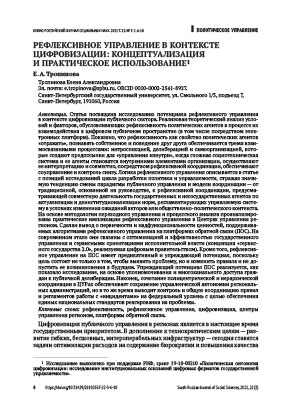Аннотация
Статья посвящена исследованию потенциала рефлексивного управления в контексте цифровизации публичного сектора. Реализован теоретический анализ условий и факторов, обусловливающих рефлексивность политических агентов в процессе их взаимодействия в цифровом публичном пространстве (в том числе посредством электронных платформ). Показано, что рефлексивность как свойство политических агентов «отражать», познавать собственное и поведение друг друга обеспечивается тремя взаимосвязанными процессами: интроспекцией, делиберацией и самоорганизацией, которые создают предпосылки для «управления изнутри», когда сложная социотехническая система и ее агенты становятся внутренними элементами организации, осуществляют ее интерпретацию и совместно, посредством рефлексивной координации, обеспечивают соуправление и контроль снизу. Логика рефлексивного управления описывается в статье с позиций исследований цикла разработки политики и управляемости, отражая значимую тенденцию смены парадигмы публичного управления и модели координации — от традиционной, основанной на руководстве, к рефлексивной координации, предусматривающей совместную деятельность государственных и негосударственных агентов по актуализации и деинституционализации норм, регламентирующих управляемую систему в условиях изменения ожиданий акторов или общественно-политического контекста. На основе методологии переходного управления и процессного анализа проанализированы практические импликации рефлексивного управления в Центрах управления регионом. Сделан вывод о первичности и надфункциональности ценностей, поддерживаемых алгоритмами рефлексивного управления на платформах обратной связи (ПОС). На современном этапе они связаны с оптимизацией и эффективностью государственного управления и сервисными ориентациями исполнительной власти (концепция «сервисного государства 2.0», реализуемая цифровым правительством). Кроме того, рефлексивное управление на ПОС имеет предикативный и упреждающий потенциал, поскольку цель состоит не только в том, чтобы выявить проблему, но и изменить правила и не допустить ее возникновения в будущем. Упреждающий потенциал ПОС реализуется, как показало исследование, на основе уполномочивания и многоканального доступа граждан к публичной делиберации. Наконец, сочетание полицентрической и иерархической координации в ЦУРах обеспечивает сохранение управленческой автономии региональных администраций, но в то же время выводит контроль и общую координацию правил и регламентов работы с «инцидентами» на федеральный уровень с целью обеспечения единых национальных стандартов реагирования на проблемы.
Ключевые слова
Информация о финансировании
Исследование выполнено при поддержке РНФ, грант 19-18-00210 «Политическая онтология цифровизации: исследование институциональных оснований цифровых форматов государственной управляемости».
Библиографические ссылки
Alekseeva, T. A. (2001). Spravedlivost’ kak politicheskaya kontseptsiya: Ocherk sovremennykh zapadnykh diskussiy [Justice as a Political Concept: An Essay of Modern Western Discussions]. M.: Moskovskiy obshchestvennyy nauchnyy fond.
Bol’shakova, Y. M. (2021) Voprosy tsifrovizatsii v kontekste sovremennogo etapa evolyutsii publichnogo upravleniya [Issues of Digitalization in the Context of the Current Stage of the Evolution of Public Administration]. Vlast’ [Power], 4, 43–48.
Boltanski, L., Thevenot, L. (1999). The Sociology of Critical Capacity. European Journal of Social Theory, 3, 359–377.
Dryzek, J. S. (1990). Discursive Democracy: Politics, Policy, and Political Science. Cambridge: Cambridge University Press.
Dryzek, J. S. (2013). The deliberative democrat’s Idea of Justice. European Journal of Political Theory, 12(4), 329–346. DOI: 10.1177/1474885112466784
Dryzek, John S., Berejikian, J. (1993). Reconstructive Democratic Theory. American Political Science Review, 87(1), 48–60.
Feindt, P., Weiland, S. (2018). Reflexive Governance: Exploring the Concept and Assessing its Critical Potential for Sustainable Development. Introduction to the Special Issue. Journal of Environmental Policy & Planning, 20(6), 661–674, DOI: 10.1080/1523908X.2018.1532562
Gulledge, T., Sommer, R. (2002). Business Process Management: Public Sector Implications. Business Process Management Journal, 8, 364–376. DOI: 10.1108/14637150210435017
Hofmann, J., Katzenbach, C., Gollatz, K. (2017). Between Coordination and Regulation: Finding the Governance in Internet Governance. New Media & Society, 19(9), 1406–1423. DOI: 10.1177/1461444816639975
Kanarsh, G. Y. (2011). Sotsial’naya spravedlivost’: filosofskiye kontseptsii i rossiyskaya situatsiya [Social Justice: Philosophical Concepts and the Russian Situation]. M.: Izdatel’stvo Moskovskogo gumanitarnogo universiteta.
Kemp, R., Loorbach, D. (2006). Transition Management: A Reflexive Governance Approach. In J. Voss, D. Bauknecht & R. Kemp. (Eds) Reflexive Governance for Sustainable Development. Cheltenham, Edward Elgar.
Latour, B. (2010). A Collective of Humans and Nonhumans. In Technology and Values: Essential Readings. Willey-Blackwell.
Lawless, J. S. (2010). Reflexive Governance: Redefining the Public Interest in a Pluralistic World. Hart Publishing.
Lefevr, V. A. (1967). Konfliktuyushchie struktury [Conflicting Structures]. M.: Vysshaya shkola.
Postanovleniya Pravitel’stva Rossiyskoy Federatsii ot 16 noyabrya 2020 goda, № 1829, 1830 [Resolutions of the Government of the Russian Federation dated 16 November 2020, № 1829, 1830]. Retrieved from http://government.ru/news/40861/
Rolz, D. (2010). Teoriya spravedlivosti [Theory of Justice]. M.: LKI.
Shchedrovickiy, G. P. (1967). O metode semioticheskogo issledovaniya znakovykh system. Semiotika i vostochnye yazyki [On the Method of Semiotic Research of Sign Systems. Semiotics and Oriental Languages]. M.: Nauka.
Shveri R. (1996) Teoreticheskaya sotsiologiya Dzheymsa Koulmena: analiticheskiy obzor [Theoretical Conception of James S. Goleman: An Analytical Review]. Sociologicheskij zhurnal [Sociological Journal], 1–2, 62–81.
Situatsionnyye tsentry razvitiya kak integratory gosudarstvennogo upravleniya v samorazvivayushchikhsya polisub’’yektnykh sredakh [Situation Centres for Development as Integrators of Public Administration in Self-developing Multi-entity Environments]. (2019). M.: Kogito-centr.
Smith, A., Stirling, A. & Berkhout, F. (2005). The Governance of Sustainable Socio-Technical Transitions. Research Policy, 1491–1510. DOI: 10.1016/j.respol.2005.07.005
Smith, A., Stirling, A. (2007). Moving Outside or Inside? Objectification and Reflexivity in the Governance of Socio-Technical Systems. Journal of Environmental Policy&Planning, 9(3–4), 351–373, DOI: 10.1080/15239080701622873
Smith, A., Stirling, A. (2008). Social–Ecological Resilience and Socio-Technical Transitions: Critical Issues for Sustainability Governance. Brighton: STEPS Centre.
Smorgunov L. V. (2017). Gosudarstvo, sotrudnichestvo i inklyuzivnyy ekonomicheskiy rost [The State, Cooperation and Inclusive Economic Growth]. Vlast’ [Power] 11, 22–30.
Smorgunov L. V. (2020) Instituty dostupnosti tsifrovykh platform i gosudarstvennaya upravlyayemost’ [Institutions for Affordances of Digital Platforms and Public Governability]. Yuzhno-rossiyskiy zhurnal sotsial’nykh nauk [South Russian Journal of Social Sciences], 21(3), 6–19. DOI: 10.31429/26190567-21-3-6-19
Torgerson, D. (2007). Policy Discourse as Dialogue: Emergent Publics and the Reflexive Turn. Critical Policy Studies, 1, 1–17, DOI: 10.1080/19460171.2007.9518506
Tropinova, E. (2020). Institutionalization of Digital Public Administration Design: The Reflexive Potential of Agents of Change. Journal of Economic Regulation, 11, 78–86.
Tsentr upravleniya regionom Gubernatora Moskovskoy oblasti [Regional Management Center of the Governor of the Moscow Region]. Retrieved from http://d-russia.ru/wp-content/uploads/2019/09/rymar.pdf
Usov, V. N. (2008). Refleksivnoye upravleniye: filosofsko-metodologicheskiy aspekt [Reflexive Management: Philosophical and Methodological Aspect] (Abstract of Doctoral Dissertation) Ekaterinburg.
Сhilvers J. (2013). Reflexive Engagement? Actors, Learning, and Reflexivity in Public Dialog on Science and Technology. Science Communication, 35(3), 283–310. DOI: 10.1177/1075547012454598


